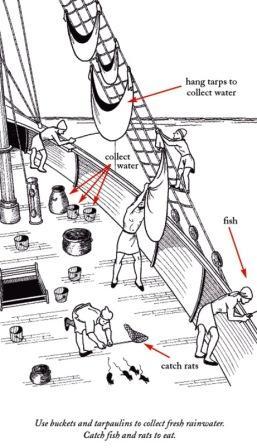
Sail to land.
Finding land is the best option when provisions become dangerously low. Virtually any land animal is safe to eat if the flesh if thoroughly cooked or salted. Provided that they can be spotted and shot, wild goats, pigs, cattle, penguins, and monkeys will be popular options among the crew. Avoid eating unidentifiable mushrooms or plants, as they may be poisonous.
Ration.
Place the crew on half rations, particularly when the likelihood of sighting land is low or unknown. Move to quarter rations if necessary. Be prepared for poor morale among the crew and added stress as they adjust to the new measures, including less rum to drink.
Collect rainwater.
Put buckets on deck to collect water during storms. Hang sails tarpaulins, or mats from the rigging during the rain and wring them out into buckets.
Catch fish.
Assign members of the crew to catch fish congregating under the ship or in its shadow.
Eat in the dark.
If any remaining grains on the ship are infested with worms or weevils, wait until nightfall to eat so as not to see the bugs in the food. Eating insect-ridden food is better than not eating at all.
Eat crumb dough.
Instruct the cook to sweep up break crumbs from the bread room, mix them with water, and either bake this “dough” or serve it to the crew uncooked. (Peas and oats may be recovered in similar fashion from the hold.)
Hunt for rats.
Rats will be prevalent aboard the ship due to lax sanitary conditions. Catch them, gut and skin them, and roast them in the galley. Rats may also be traded among the crew for money or other provisions.
Be Aware:
- The typical crewmember was allotted a ration totaling about 3,500 calories each day, with a diet of dried or salted beef or pork, salted fish, hard ship’s biscuits, rice, dried peas, cheese, onions, garlic, oil, vinegar, water, and beer, wine or other liquor.
- Ships’ captains often chose to take less direct, island-hopping routes that would allow them to replace or restock rotting, insect- and rodent-infested provisions on board.